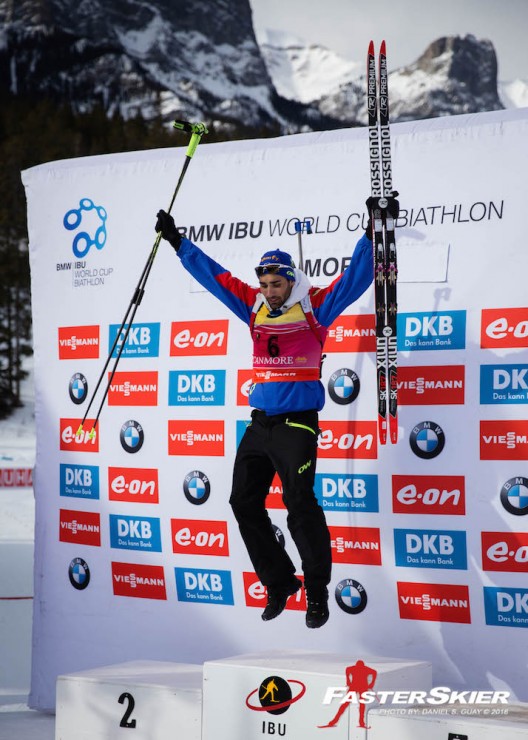
Two words: jet lag. Martin Fourcade had to deal with it, but so did the Canadians on their return trip to Canmore for the International Biathlon Union (IBU) World Cup Feb. 4 through 7.
The overall World Cup leader from France, Fourcade touched down in Calgary, Alberta, four days ago. On Instagram, he noted that it had been “5 years since the last time I competed in North America. Really happy to be here for 2 beautiful weeks of competition!” he wrote, according to a translation, referring to the World Cups in Canmore followed by Presque Isle, Maine, next week.
Like the rest of the field traveling to Canada from Europe, he was eight hours removed from Central European time, and it might have felt like he should be winding down for the evening when he stood on top of the podium Thursday afternoon in Canmore.
Regardless, he won, and did so without much trouble — at least by the looks of it. Fourcade hit all 10 of his targets in the men’s 10-kilometer sprint on Thursday and skied the fastest overall course time to win comfortably, by 15.7 seconds over Russia’s Anton Shipulin in second place.
But racking up win No. 43 wasn’t all that easy, Fourcade later explained.
“I was a bit nervous,” he told the IBU. “I was not satisfied with my shooting this week during training and today, I had some problems zeroing. But I was confident on my skis, I was clean and fast enough to win, so I am happy.”
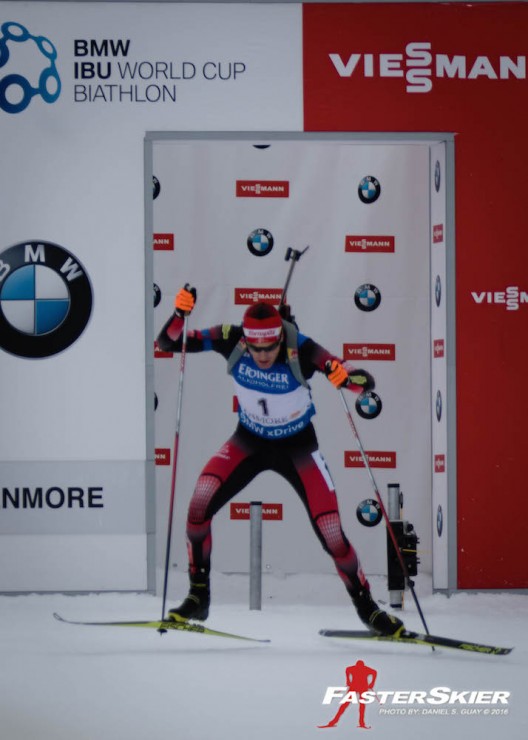
The sixth starter, Fourcade took control of the race early, skiing through the first 1 k checkpoint 1 1/2 seconds faster than Austria’s Simon Eder, who started first. Both cleaned prone, and Fourcade left the range 0.6 seconds behind Eder. Shipulin in bib 7 blazed through the first shooting even faster, cleaning prone and leaving the range with a 3.6-second lead over Eder.
Shipulin held his own for most of the second loop as well, and just like Fourcade, cleaned standing, but left the range in second, 6.3 seconds behind Fourcade. Germany’s Simon Schempp (in bib 4) also hit 100 percent of his targets in both stages to move into third, 11 seconds behind Fourcade with one loop to go.
There, Fourcade extended his gap over Shipulin to 8.6 seconds early in the final loop. Schempp skied in third, nearly 15 seconds behind. The order held to the finish: Fourcade won in 23:51.5, Shipulin finished 15.7 seconds off his pace in second and Schempp 18.7 seconds behind in third.
“I spoke with Simon and Anton, and we all had the same feeling about the track,” Fourcade told German broadcaster ZDF in an English interview. “When we trained, we felt like it’s an easy track, but I knew it will be hard because of the altitude, and because the track is really wide you feel to be really slow. I think I had a good strategy keeping some strength on the first loop, and being as fast as possible on the last one.”
Canmore’s elevation is roughly 1,400 meters (4,600 feet).
“I really like this place; it is very friendly and I love the atmosphere with the teams and the local people,” Fourcade told the IBU. “If we are truly an international sport, we need to come to places like this out of Europe.”
“I really like this place; it is very friendly and I love the atmosphere. … If we are truly an international sport, we need to come to places like this out of Europe.” — Martin Fourcade, Thursday’s sprint winner and overall IBU World Cup leader
Schempp explained that the three podium finishers — all of which shot clean in the two-stage race — chatted while changing into dry clothes afterward.
“We all didn’t have a really good feeling out on the course because it’s relatively slow,” Schempp told ZDF. “You have to push all the time, you have very little time to relax because you pretty much ski from the lowest to the highest point. … So none of us felt they were skiing really fast, but the times are still good and I am very satisfied with the result.”
Asked what it was like to race overseas, Schempp told ZDF, “A little different, because your body is adapted to another time. At home it’s evening now. Of course, we had a little bit of lead time, three or four days, but … normally, you would sit on the couch or almost go to bed already right now, and instead you have to compete. That’s different, but the same for everyone.”
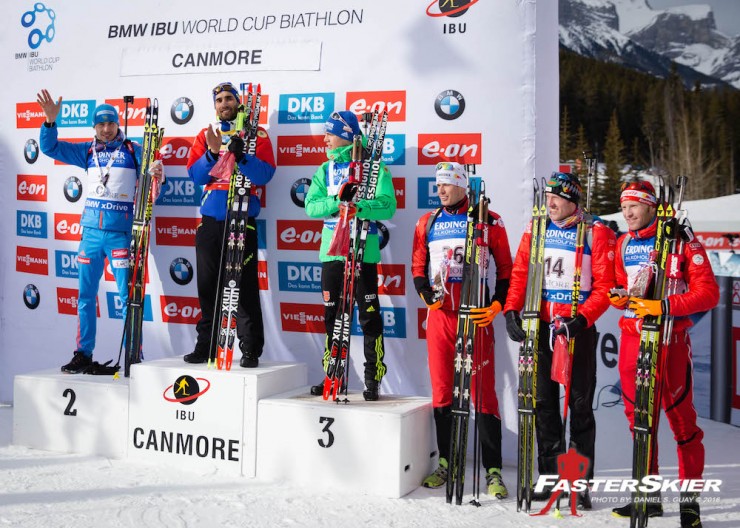
Austria swept fourth through sixth, and while Eder cleaned both stages, he wasn’t the fastest of the three. Eder placed sixth, 47.6 seconds behind Fourcade and just behind his teammates, Julian Eberhard with a career-best fourth (+45.0) and Dominik Landertinger in fifth (+47.1).
“I already noticed during the last days that my body feels very good,” Eberhard said in an Austrian team press release.
He previously placed seventh in a sprint earlier this season in Hochfilzen, Austria. On Thursday, he had a single penalty in each stage and the second-fastest course time, 6.8 seconds slower than Fourcade.
“The course here suits me well,” Eberhard said of Canmore. “That makes every strength session in the summer pay dividends, because you can really put that on the track here. I am happy that my shape is trending upwards ahead of the World Championships.”
Landertinger cleaned prone and missed one standing. Seven of the top 11 men cleaned the sprint, including the top three.
Davies’ Dream Come True
While he didn’t clean, Tim Burke posted the 10th fastest overall course time to place 23rd, 1:44.8 behind Fourcade, with two standing penalties. He led the North Americans on Thursday, with U.S. teammate Lowell Bailey following in 24th (+1:45.2), also with two standing misses.
The top Canadian Macx Davies finished less than half a second farther back in 25th (+1:45.7), and the third American, Leif Nordgren placed 26th (+1:46.7).
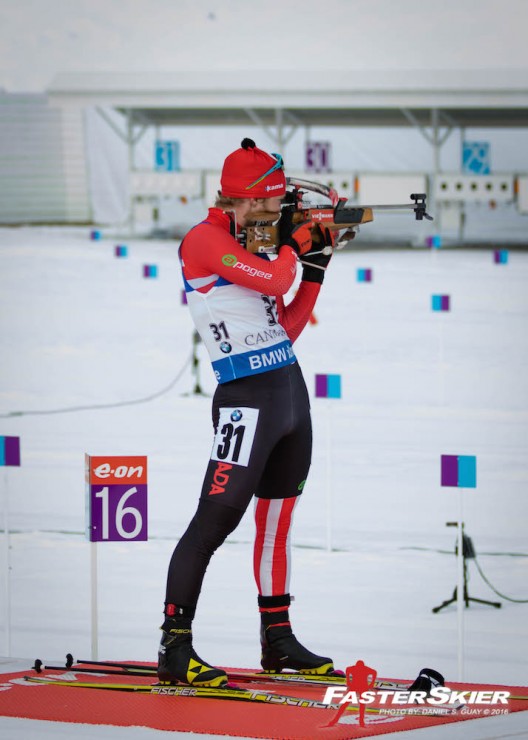
Out of that group, Davies, 23, was the only one to shoot clean. In doing so, he posted his second-best World Cup result of his career — in his hometown.
“I started the day with the goal of being top 20 and after seeing the first few athletes in the range I knew that I would have to shoot clean to do that,” Davies, the 31st starter, wrote in an email. “And once I made that decision there was no other possibility.”
Knowing the course well, he decided to conserve for the final loop. Afterward, he reflected that he paced it well and “was able to give a good punch on the finishing climbs.
“I didn’t realize how good of a day it was until I was on my final loop and the coaches and wax techs were screaming at me, telling me that I was close to the top 20 and needed to ski faster!” Davies wrote. “My thoughts after I cleaned standing were accepting that I would have to ski very hard on my final loop if I wanted to stay with the people around me.”
Davies initially finished 19th, about a second back from Burke’s time. Bailey in bib 38 ended up between them, and all three slipped a few places outside the top 20, but it was enough for Davies.
“I am so happy to have had this race at home! It is truly a dream of mine to race well in front of my home crowd and I feel happy that I could show where Biathlon Canada is going, and it is only up!” Davies wrote.
“After seeing the first few athletes in the range I knew that I would have to shoot clean … And once I made that decision there was no other possibility.” — Macx Davies (Biathlon Canada) on shooting 10-for-10 in Thursday’s sprint to place 25th
As somewhat of an aside, his father is the chairperson of the event.
“It makes me realize how much effort from a few people it actually takes to make a World Cup event happen,” Davies noted. “I am proud to have him so closely tied to me and it doesn’t add any pressure, just makes the victory sweeter.”
While many of the Europeans chose to spend the bye week at home, Burke and several other North American flew directly to Canmore after the last World Cup two weeks ago in Antholz, Italy. That gave Burke 10 days to get his legs back under him.
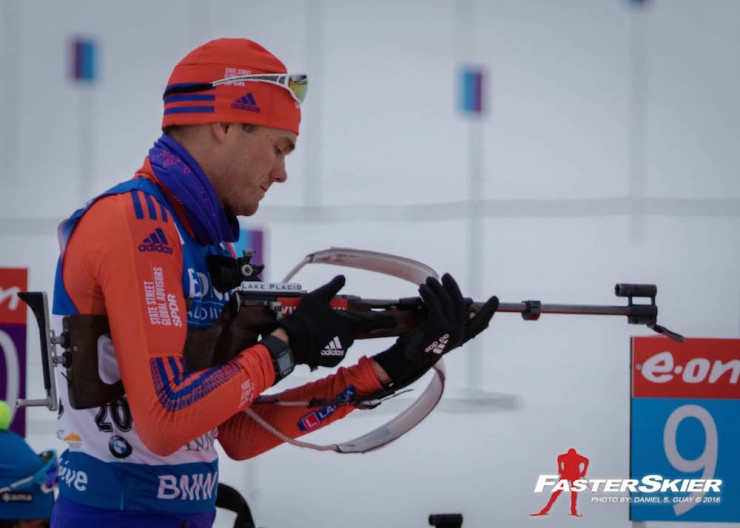
“This was my first winter race in North America in 5 years! I feel like the Canadian crowd was also cheering for us, so it made the race a lot of fun,” Burke, who turned 34 on Wednesday, wrote in an email.
During the race, he started 20th and found himself in the top 10 with a clean prone, leaving the range for his second loop in ninth. After two misses in standing, he was down to 15th. While Burke initially finished 14th, nine men behind him bumped him into 23rd.
“I was not happy with my two standing misses but this simply happens in biathlon,” Burke wrote. “I was more frustrated with my skiing today. I feel like I had great preparation for these races and this course is perfect for my strengths. I’m not really sure why, but I just felt really flat today right from the start. I’m hoping that this effort was a wake up call for my body and that I will bounce back for the Mass Start on Saturday.”
Based on a provisional start list for Saturday’s mass start, which includes only the top 30 athletes, Burke, Bailey and Canada’s Nathan Smith are in (ranked 20th, 16th and 14th, respectively). On Thursday, Smith placed 31st (+1:52.7) with a single prone penalty.
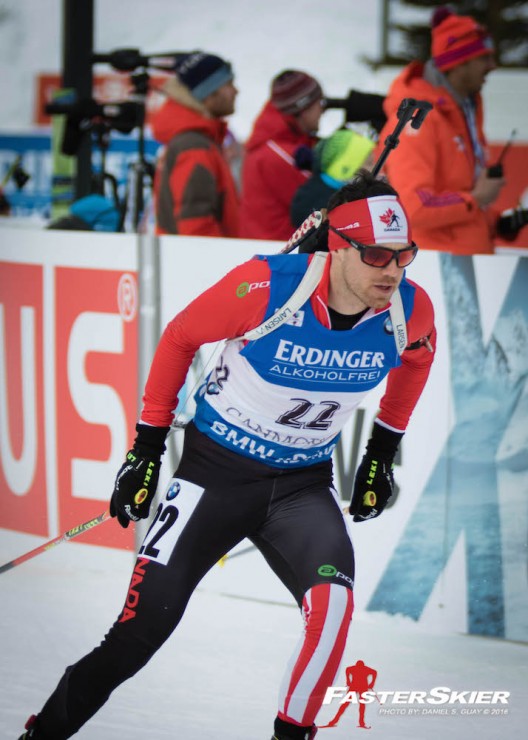
“I have been struggling skiing for the last few weeks,” Smith, the second-best Canadian on Thursday, wrote in an email. “Before it could’ve been my back pain, but today I didn’t have any. Late last week in intensity I felt in top form, but then in race prep yesterday I just felt totally heavy. Unfortunately it was the same today.”
On the upside, “My shooting had been rock solid for the last two weeks,” he added. “No worries there. I’m hoping that today’s tough ski will have gotten me into better shape for the mass start and mixed relays this weekend.”
While Bailey was alternatively pleased with his clean prone stage, his two standing misses left him “extremely disappointed,” he wrote in an email.
“I missed both shots by a few millimeters,” Bailey explained. “I think it hurts a little more when you realize how close everything was.”
Asked about pacing on Canmore’s course, the 34-year-old US Biathlon veteran noted: “This course has a huge climb — perhaps the longest on the world cup circuit — so I really tried to work that climb so that I was able to push in the last part of the hill. I definitely felt fatigued by the last time up it, but I think a lot of athletes were feeling this way as well.
“I’m ok with a top-25 but I know I can do better than this,” Bailey added. “I just have to re-focus and set my sights on the next races. I’m confident in our preparation and I really feel like we can put together some quality results during the North American tour.”
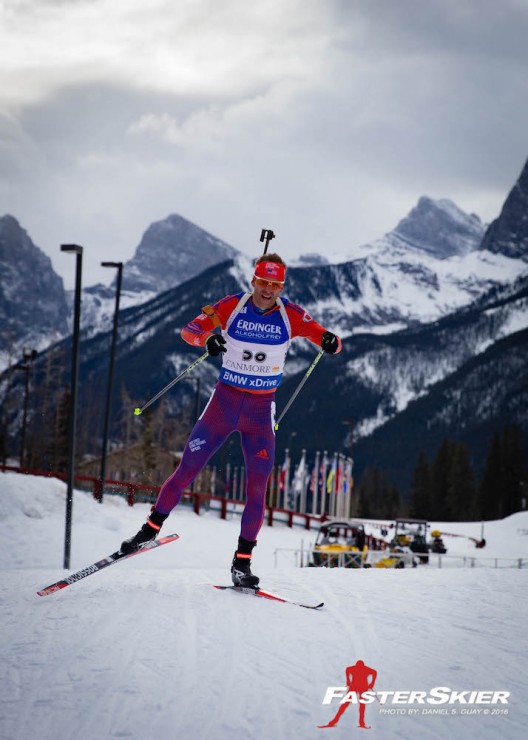
Nordgren was disappointed to miss his last prone shot — his only penalty of the day. The 49th starter, Nordgren found himself in 41st initially after the first shooting. He then improved to 27th after the second shooting with a clean standing stage.
“I know I’m capable of more, and I showed it last season,” Nordgren wrote in an email. “… Missing the last shot in any stage is just painful. I haven’t raced here in a few years, but I remember going out too hard last time and blowing up pretty hard on the last loop. Today I tried to start pretty aggressive, while still leaving enough to ski a good last loop.
“The most disappointing thing is knowing I would have been in the mass start on Saturday had I hit that prone shot, which leaves a bitter taste in my mouth even though it was a fairly good race,” he added.
Before Canmore, Nordgren spent a few days at home in Minnesota.
“Since I wasn’t there for Christmas it was good to just relax at home, even if it was really short,” he wrote. “I traveled to Canmore Last Thursday in order to get a few days extra to adjust to the altitude. It’s been nice here in Canmore, the snow is in really good condition and the temps have been pretty mild.”
For the home team, the atmosphere was uplifting. A couple thousand spectators came out for the races, Smith estimated, and a large number of them were schoolchildren. Smith is originally from nearby Calgary.
“Maybe one day one of those students in the crowd will represent Canada at the Olympics,” he wrote. “At the start I felt really proud to be representing Canada at home, to be an ambassador for the sport, and knowing that I’m racing for something larger than just myself.”
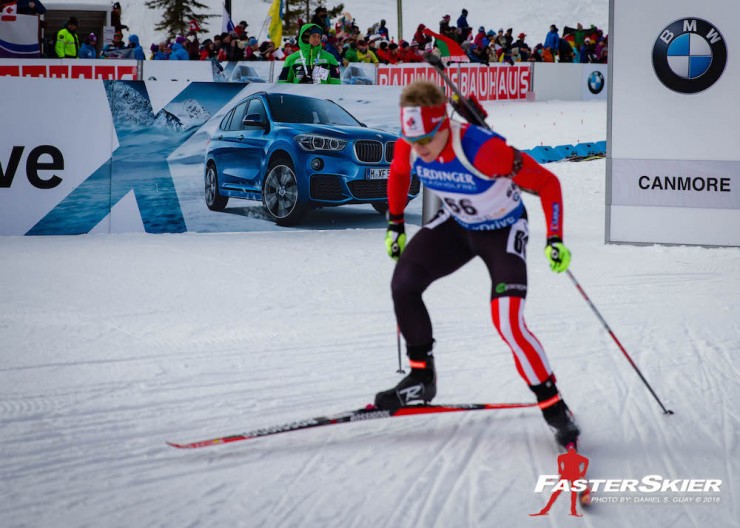
In 34th, about three seconds behind Smith, Canada’s Scott Gow, 25, had one of his top-five best results. Like Davies, the Gow brothers also grew up in Canmore. Scott Gow had one prone penalty to finish 1:55.5 behind Fourcade.
In an email, Gow explained that his race started like any other: “There were a few nerves I needed to get out of my system but after 1km everything felt normal,” he wrote. “I got some splits saying my ski time was good, and the techs kept telling me throughout the race that I was maintaining good ski speed.”
While he wasn’t happy with his prone miss, his standing stage gave him “renewed motivation to really try and hammer out my last lap,” Gow added. “It was nice skiing by the stadium and having a few hundred people cheering me on, making sure I finish well. … I’m happy with my end result. I was hoping to feel better on skis and of course I would have liked to hit all my targets. Overall I’m very pleased.”
His brother, Christian Gow, and Brendan Green also had one miss each (both in standing) and ended up in 61st (+2:50.2) and 40th (+2:09.5), respectively.
The fourth American, Max Durtschi in his first-ever World Cup placed 85th with five penalties (2+3).
“Overall, I am disappointed with my performance today,” Durtschi, a 24-year-old former professional cyclist, wrote in an email. “I felt solid on skis, but my shooting was not up to standard. At the World Cup level you cannot shoot 50% and call it a good day. Representing the USA at this level is a big privilege, and I expect a much better performance out of myself in the range.”
A member of US Biathlon’s X-team, he is slated to join the World Cup team in Presque Isle next week.
“The next days I am focusing on training and improving!” Durtschi wrote. “I will remain open minded to whatever comes my way. For now, I need to continue to work on the fundamentals of the sport.”
— Harald Zimmer contributed reporting
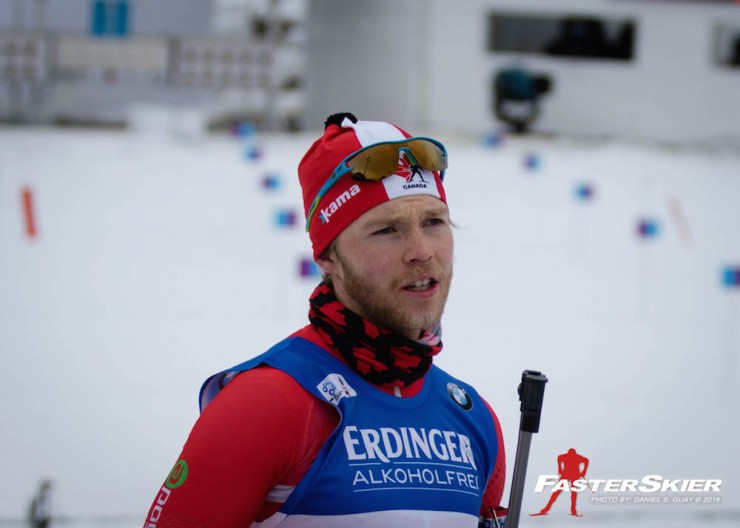
Alex Kochon
Alex Kochon (alexkochon@gmail.com) is a former FasterSkier editor and roving reporter who never really lost touch with the nordic scene. A freelance writer, editor, and outdoor-loving mom of two, she lives in northeastern New York and enjoys adventuring in the Adirondacks. She shares her passion for sports and recreation as the co-founder of "Ride On! Mountain Bike Trail Guide" and a sales and content contributor at Curated.com. When she's not skiing or chasing her kids around, Alex assists authors as a production and marketing coordinator for iPub Global Connection.



